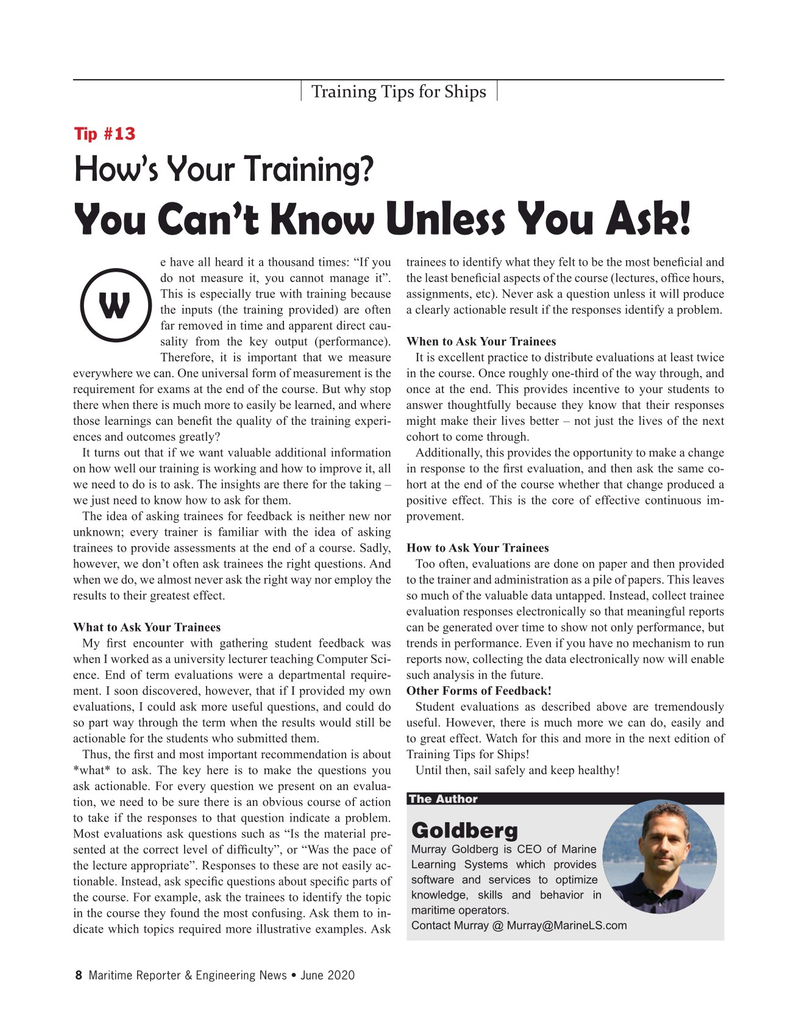
Page 8: of Maritime Reporter Magazine (June 2020)
2020 Yearbook
Read this page in Pdf, Flash or Html5 edition of June 2020 Maritime Reporter Magazine
Training Tips for Ships
Sea. Worthy.
Tip #13
View Video
How’s Your Training?
You Can’t Know Unless You Ask!
e have all heard it a thousand times: “If you trainees to identify what they felt to be the most benefcial and do not measure it, you cannot manage it”. the least benefcial aspects of the course (lectures, offce hours,
This is especially true with training because assignments, etc). Never ask a question unless it will produce the inputs (the training provided) are often a clearly actionable result if the responses identify a problem.
W far removed in time and apparent direct cau- sality from the key output (performance). When to Ask Your Trainees
Therefore, it is important that we measure It is excellent practice to distribute evaluations at least twice everywhere we can. One universal form of measurement is the in the course. Once roughly one-third of the way through, and requirement for exams at the end of the course. But why stop once at the end. This provides incentive to your students to there when there is much more to easily be learned, and where answer thoughtfully because they know that their responses those learnings can beneft the quality of the training experi- might make their lives better – not just the lives of the next ences and outcomes greatly? cohort to come through.
It turns out that if we want valuable additional information Additionally, this provides the opportunity to make a change on how well our training is working and how to improve it, all in response to the frst evaluation, and then ask the same co- we need to do is to ask. The insights are there for the taking – hort at the end of the course whether that change produced a we just need to know how to ask for them. positive effect. This is the core of effective continuous im-
The idea of asking trainees for feedback is neither new nor provement.
unknown; every trainer is familiar with the idea of asking trainees to provide assessments at the end of a course. Sadly, How to Ask Your Trainees however, we don’t often ask trainees the right questions. And Too often, evaluations are done on paper and then provided when we do, we almost never ask the right way nor employ the to the trainer and administration as a pile of papers. This leaves results to their greatest effect. so much of the valuable data untapped. Instead, collect trainee evaluation responses electronically so that meaningful reports
Workboat-Ready Digital Communication
What to Ask Your Trainees can be generated over time to show not only performance, but
My frst encounter with gathering student feedback was trends in performance. Even if you have no mechanism to run
System Solutions.
when I worked as a university lecturer teaching Computer Sci- reports now, collecting the data electronically now will enable ence. End of term evaluations were a departmental require- such analysis in the future.
Contact David Clark for rugged, reliable and proven communication solutions to enhance the situational ment. I soon discovered, however, that if I provided my own Other Forms of Feedback!
awareness, effciency and safety of crew members on board workboats, RHIB interceptors, service vessels, evaluations, I could ask more useful questions, and could do Student evaluations as described above are tremendously fre boats, tug and salvage boats, government and municipal patrol craft. Call 800-900-3434 (508-751- so part way through the term when the results would still be useful. However, there is much more we can do, easily and actionable for the students who submitted them. to great effect. Watch for this and more in the next edition of 5800 Outside the USA) to arrange a system demo or visit www.davidclark.com for more information.
Thus, the frst and most important recommendation is about Training Tips for Ships!
*what* to ask. The key here is to make the questions you Until then, sail safely and keep healthy!
Versatility
Scalability
Simplicity ask actionable. For every question we present on an evalua-
The Author tion, we need to be sure there is an obvious course of action to take if the responses to that question indicate a problem.
Most evaluations ask questions such as “Is the material pre-
Goldberg
Murray Goldberg is CEO of Marine sented at the correct level of diffculty”, or “Was the pace of
Learning Systems which provides the lecture appropriate”. Responses to these are not easily ac- software and services to optimize tionable. Instead, ask specifc questions about specifc parts of knowledge, skills and behavior in the course. For example, ask the trainees to identify the topic maritime operators. in the course they found the most confusing. Ask them to in-
Contact Murray @ [email protected] dicate which topics required more illustrative examples. Ask
An Employee Owned ©2018 David Clark Company Incorporated ®Green headset domes are a David Clark registered trademark.
8 Maritime Reporter & Engineering News • June 2020
American Company
WWW.DAVIDCLARK.COM 230-35296 Worthy 8375X10875REV3MRE.indd 1 5/26/20 11:19 AM

 7
7

 9
9
